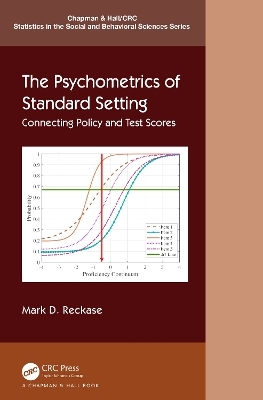
The Psychometrics of Standard Setting
Chapman & Hall/CRC (Verlag)
9781498722117 (ISBN)
This book provides a unifying structure for the activities that fall under the process typically called "standard setting" on tests of proficiency. Standard setting refers to the methodology used to identify performance standards on tests of proficiency. The results from standard setting studies are critical for supporting the use of many types of tests. The process is frequently applied to educational, psychological, licensure/certification, and other types of tests and examination systems. The literature on procedures for standard setting is extensive, but the methodology for standard setting has evolved in a haphazard way over many decades without a unifying theory to support the evaluation of the methods and the validation of inferences made from the standards. This book provides a framework for going beyond specific standard setting methods to gain an understanding of the goals for the methods and how to evaluate whether the goals have been achieved.
The unifying structure provided in this book considers policy that calls for the existence of performance standards, the relationship of proficiency test design to the policy, and tasks assigned to subject matter experts to help them convert the policy to estimates of locations on the reporting score scale for the test.The book provides guidance on how to connect the psychometric aspects of the standard setting process to the intentions of policy makers as expressed in policy statements. Furthermore, the structure is used to support validity arguments for inferences made when using standards. Examples are provided to show how the unifying structure can be used to evaluate and improve standard setting methodology.
Mark D. Reckase has decades of experience developing and reviewing standard setting processes as well as doing advanced work in psychometric theory. He is currently a University Distinguished Professor Emeritus at Michigan State University. He has been the editor of Applied Psychological Measurement and the Journal of Educational Measurement. He has also served as the president of the National Council on Measurement in Education and the International Association for Computerized Adaptive Testing, and as the vice president of Division D of the American Educational Research Association.
1. Conceptual Overview for a Theory of Standard Setting 2. A Theory of Standard Setting 3. Agency, Policy Definitions, Content Specific Definitions and Minimum Qualifications 4. The Construct and the Test Designed to Measure the Construct 5. The Kernel of the Standard Setting Process 6. Panelist Selection and Training 7. Feedback and Auxiliary Information 8. Estimating the Standard 9. Evaluating the Standard Setting Process 10. Trends in Standard Setting Design and Development
| Erscheinungsdatum | 06.12.2022 |
|---|---|
| Reihe/Serie | Chapman & Hall/CRC Statistics in the Social and Behavioral Sciences |
| Zusatzinfo | 34 Tables, black and white; 31 Line drawings, black and white; 31 Illustrations, black and white |
| Sprache | englisch |
| Maße | 156 x 234 mm |
| Gewicht | 520 g |
| Themenwelt | Geisteswissenschaften ► Psychologie ► Allgemeine Psychologie |
| Mathematik / Informatik ► Mathematik | |
| ISBN-13 | 9781498722117 / 9781498722117 |
| Zustand | Neuware |
| Informationen gemäß Produktsicherheitsverordnung (GPSR) | |
| Haben Sie eine Frage zum Produkt? |
aus dem Bereich


